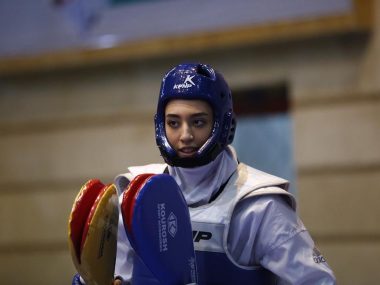Dubai: Iran’s only female Olympic medallist has said on social media she had left her homeland because she had had enough of being used by its authorities as a propaganda tool. [caption id=“attachment_7897161” align=“alignleft” width=“380”]  Iran’s Kimia Alizadeh won a bronze medal at the 2016 Olympics. Source:Instagram[/caption] Taekwondo champion Kimia Alizadeh, who won a bronze medal at the 2016 Rio Olympics, implied in an Instagram post that she had moved to Europe. She wrote on an account she has used for some time, but it was not immediately possible to verify her location. “No one has invited me to Europe and I haven’t been given a tempting offer. But I accept the pain and hardship of homesickness because I didn’t want to be part of hypocrisy, lies, injustice and flattery,” she said. Mahin Farhadizadeh, a deputy Iranian sports minister, said: “I have not read Kimia’s post, but as far as I know she always wanted to continue her studies in physiotherapy,” the semi-official ISNA news agency reported. Alizadeh said the Islamic Republic’s authorities had attributed her success to their management and the fact that she wore the Islamic veil, which is obligatory in Iran. “I am one of the millions of oppressed women in Iran whom they’ve been playing for years… I wore whatever they told me and repeated whatever they ordered. Every sentence they ordered I repeated,” she wrote. “None of us matter for them, we are just tools.” She said that while the government exploited her medals politically, officials would humiliate her with remarks such as “It is not virtuous for a woman to stretch her legs!”
Alizadeh said at the time of her medal in the 57kg category that it had made her happy for Iranian girls. On Sunday she appeared torn by her decision. “Should I start with hello, goodbye or condolences? Hello oppressed people of Iran, goodbye noble people of Iran, my condolences to you people who are always mourning,” she wrote. In the past week, 176 people, many Iranians with dual citizenship, were killed when the Iranian military mistakenly shot a Ukrainian airliner down, and at least 56 died in a stampede at the funeral for an Iranian military commander killed by a U.S. air strike. Alizadeh is the third top Iranian sports person to stop representing the country in recent months. In December, Iran’s Chess Federation said top rated chess champion Alireza Firouzja had decided not to play for Iran over its informal ban on competing against Israeli players. Three months earlier, the International Judo Federation said Iranian judoka Saeid Mollaei had refused to return home over fears for his safety after he ignored orders from his national federation to pull out of fights to avoid a potential final meeting with an Israeli.


)

)
)
)
)
)
)
)
)



